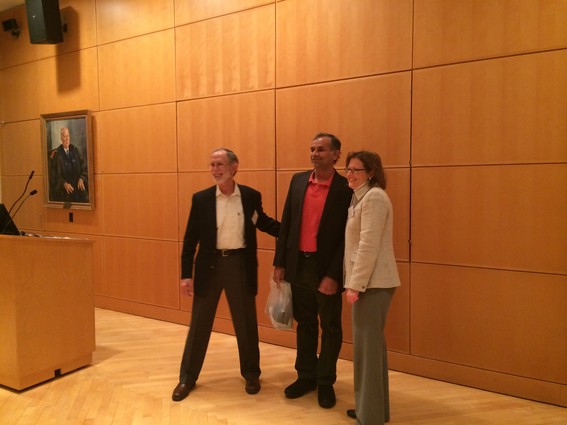Cloud-Based Wireless Router Company Wins Most Likely to Be Funded at NJEN Event

Two Stevens Institute of Technology professors who started a company based on their dynamic-spectrum research at the school recently took home a Most Likely to Be Funded award. They received the honor at the New Jersey Entrepreneurial Network (NJEN) Pitches, Posters and Networking event Feb. 12, 2014, held at Princeton University.
NJEN runs the annual gathering more like a scientific poster session than a pitch event. Participants create a poster explaining their company or idea, stand next to the poster and explain the idea to judges and others (including angels and VCs) who walk by.
Contenders are judged on the clarity of their posters and how likely their companies are to be funded. Attendees who submit an Audience Choice ballot may join the judges in voting.
Prizes are valuable. The boutique intellectual property (IP) law firm Volpe and Koenig (Princeton) provides the winners provisional patent preparation and filing — or, if they’ve already filed a patent, trademark services, which can cost as much as $5,000.
The winner, Dynamic Spectrum (Holmdel), is a startup cofounded by R. Chandramouli (who goes by the name Mouli) and K.P. Subbalakshmi (known as Suba), electrical and computer engineering professors at Stevens. Vidya Sagar, a Ph.D. student and an innovation and entrepreneurship fellow at Stevens, is a key member of the R&D team. Mouli presented the poster to the judges.
The startup is developing a cloud-controlled, cognitive, wireless router that performs dynamic spectrum management, according to Mouli. The company’s product, SpiderRadio, can sense the radio spectrum, detect primary users or interference and switch channels to find the best spectrum available. To manage the spectrum, the router takes into account user preferences such as cost constraints, desired data rates and wireless-link security requirements.
The method uses real-time, end-to-end, link-quality measurement. It dynamically optimizes real-time access to the wireless spectrum across any available wireless network according to the measurement, the professors said. The technology is based on both patented and patent-pending IP, Mouli told NJTechWeekly.com.
Possible markets for the product include interoperable first-responder communications, spectrum management solutions for wireless carriers and support for reliable, mobile, high-definition video streaming to consumer electronics devices.
Some 33 posters were presented at the event, which featured a good mix of digital and life sciences technologies. Presenters hailed from Stevens, Princeton University and NJIT and included individual startups, inventors and several members of the NJIT Enterprise Development Center.
Two awards were won by life sciences companies.
The Best Presentation award went to Szymon Suckewer of Princeton University and Peter Hersh, M.D., director of the Cornea and Laser Eye Institute and a visiting research collaborator at Princeton. They presented the poster “Development of Flapless LASIK Using Ultra-Short Pulse Laser (Fsec Laser).”
The People’s Choice for Best Poster award went to Wei Chang, Paul Lee and Armand Leone of the medical startup Regenerative Technologies, for “CartiFX Osteochondral Scaffold for Articular Cartilage Repair.”

